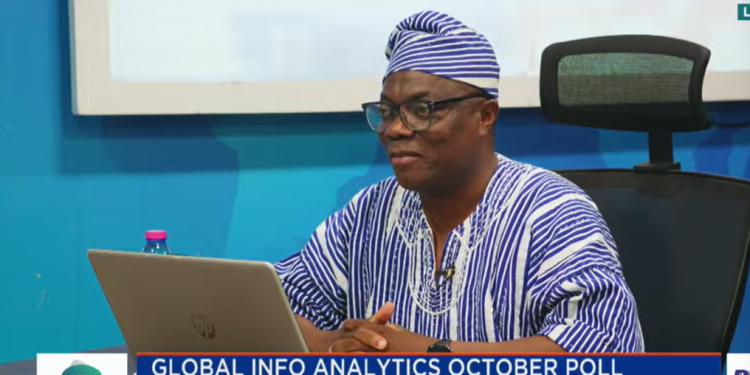The Executive Director of Global InfoAnalytics, Mussa Dankwah, has offered insight into why former Vice President Dr. Mahamudu Bawumia is enjoying a commanding lead over his rivals in the race to become the New Patriotic Party’s (NPP) presidential candidate for the 2028 elections.
In an interview on Citi FM’s The Big Issue on Saturday October 4, following the release of the latest Global InfoAnalytics tracking poll, Dankwah pointed to two key factors behind Bawumia’s dominance: his long-standing presence in NPP politics and the conservative nature of the party’s delegate base.
“I will pin this down to two factors,” Dankwah explained. “One, Bawumia has been the face of NPP since 2008. He’s been on every election ticket since then. So he is the familiar face for many people. That makes it easier for him to be organised and more likely for people to want him back on the ticket.”
The poll shows Bawumia leading the NPP presidential race with 57% support among general voters, compared to 29% for his closest contender, former Assin Central MP Kennedy Agyapong. Other aspirants trail significantly behind, with Dr. Yaw Osei Adutwum at 6%, Dr. Bryan Acheampong at 5%, and Kwabena Agyapong at 3%.
Dankwah also noted that age and tradition play a crucial role in how NPP delegates make decisions.
“The NPP delegates are conservatives. They are much older people, and the older you are, the less vibrant and dynamic and change-oriented you tend to be,” he said. “These people want to go with what they know, and they kind of dominate the NPP.”
According to the poll, Bawumia leads among NPP delegates with 47%, while Kennedy Agyapong stands at 17%. A significant 27% remain undecided, a potential opening for Agyapong’s campaign — but only if he can shift mindsets.
“If Kennedy wants to make an impact, he has to drive home a message that challenges this status quo and changes the mindset of these voters,” Dankwah said.
In key battleground regions such as Greater Accra, Central, and Western, Bawumia continues to hold a strong lead, polling at 57% compared to Agyapong’s 32%. In a potential runoff between the two, the margin widens further — Bawumia would secure 62% of the vote against Agyapong’s 38%.
As the NPP’s internal contest heats up, Dankwah’s analysis provides a window into the deeper currents shaping voter behavior — from name recognition to the role of entrenched conservatism within the party ranks.
Source: citinewsroom.com




